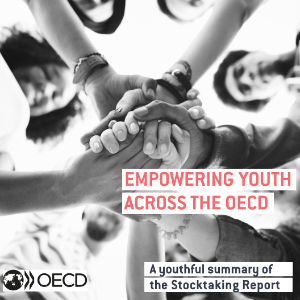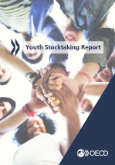Empowering Youth in OECD Countries
 The OECD Youth Stocktaking Report provides a detailed picture of how OECD member countries approach youth issues. It highlights good practice, but also identifies key areas for improvement. Most importantly, the Report makes clear how important it is to look at youth issues in their entirety – and do so in co-operation and coordination not only across all of government at federal level, but also with authorities at regional and local level.
The OECD Youth Stocktaking Report provides a detailed picture of how OECD member countries approach youth issues. It highlights good practice, but also identifies key areas for improvement. Most importantly, the Report makes clear how important it is to look at youth issues in their entirety – and do so in co-operation and coordination not only across all of government at federal level, but also with authorities at regional and local level.
Why a Youth Stocktaking Report?
- Unemployment and insecure jobs for young people are still far too common
- Young people are better educated and more informed than previous generations
- Reports show that youth have low confidence in their governments
- Young people are less likely to vote in general elections
- Youth have the least influence on policies that affect them most (climate change, rising inequality)
The Report takes 5 priority areas into focus:
- Youth policy that addresses all of young people's concerns
- The role of public institutions in youth policy
- Integration of youth perspectives in public policy processes
- Youth participation and representation
- Legal frameworks and age restrictions
|

|
|
Key findings
- 80% of OECD countries had a multi-year strategy at some point, currently 40% do (April 2018)
- Most countries manage youth affairs from a department within another Ministry, however, in some countries youth affairs are chiefly dealt with by the "centre of government" or a distinct youth ministry
- Coordination is difficult to manage, e.g., health, education, & employment are all key aspects of youth policy, but are typically organised in separate ministries
- OECD countries have only recently started to apply tools for youth mainstreaming, such as “youth checks”, but little is known about how effective they are
- While youth participation in formal institutional politics is decreasing, youth participation in new social movements, both online and offline, has gained momentum
- Young people are significantly underrepresented in state institutions including the cabinet, parliament and central public administration
- Minimum ages define when young people can vote, stand for election and participate in judicial proceedings. Setting a minimum age thus affects youth decision-making and their access to services, and can be a source for age-based discrimination.
|
-400x509.png) |
Learn more about
Global Report on Youth Empowerment and Intergenerational Equity
 The OECD Youth Stocktaking Report provides a detailed picture of how OECD member countries approach youth issues. It highlights good practice, but also identifies key areas for improvement. Most importantly, the Report makes clear how important it is to look at youth issues in their entirety – and do so in co-operation and coordination not only across all of government at federal level, but also with authorities at regional and local level.
The OECD Youth Stocktaking Report provides a detailed picture of how OECD member countries approach youth issues. It highlights good practice, but also identifies key areas for improvement. Most importantly, the Report makes clear how important it is to look at youth issues in their entirety – and do so in co-operation and coordination not only across all of government at federal level, but also with authorities at regional and local level.-400x509.png)
